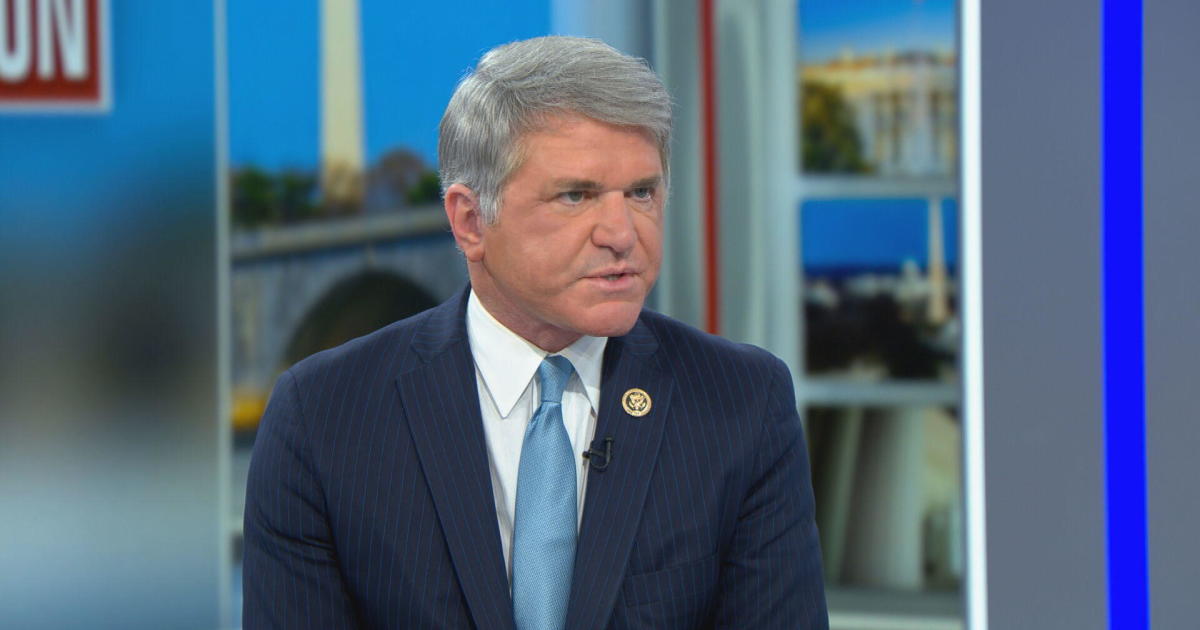Washington — Rep. Mike McCaul, the top Republican on the House Foreign Affairs Committee, criticized the White House and State Department for the chaotic withdrawal of U.S. troops from Afghanistan one year ago, saying “there was no plan” for pulling out of the country.
“There are many sins, if you will,” McCaul said in an interview with “Face the Nation.” “There was a complete lack and failure to plan. There was no plan and there was no plan executed. And, to your point, you know, even beforehand, I think the State Department probably didn’t have the resources it needed to carry out an evacuation of this size and enormity.”
The Texas lawmaker discussed the findings of a report set to be released Monday by the Republican members of the House Foreign Affairs Committee. McCaul described it as a “fairly objective report about the failures that were made” by the Biden administration in the runup to the withdrawal.
Transcript: Rep. Mike McCaul on “Face the Nation”
The report’s release coincides with the one-year anniversary of the Taliban’s swift takeover of Kabul and the fleeing of then-Afghan President Ashraf Ghani from the country. The failure of the Biden administration to anticipate the Taliban’s rapid rise fueled criticism of President Biden, who repeatedly defended his timeline for withdrawing U.S. forces from Afghanistan by Aug. 31, 2021, sooner than the Sept. 11 deadline he previously set.
The fall of Kabul also set off a chaotic rush of Afghans attempting to flee the country under Taliban rule. With the U.S. military controlling the main airport in the capital for evacuations, scores of Afghans descended on the gates surrounding it, hoping to board military planes shuttling people out of the country.
By the time the withdrawal was completed on Aug. 30, 2021, marking the official end of America’s longest war, more than 122,000 people had been evacuated from Afghanistan since the end of July 2021, including 5,400 American citizens. Secretary of State Antony Blinken estimated at the time that fewer than 200 Americans remained in the country.
The State Department estimates there are 74,000 vulnerable Afghans who have applied for special immigrant visas and are waiting to leave the country.
McCaul said the State Department was “overwhelmed” by the size of the evacuation. But the biggest issue, he said, was the “rosy picture” painted by the White House and State Department, even as the Pentagon and intelligence community were warning that the Afghan government could collapse sooner than expected.
“There’s a disconnect between, you know, intelligence on the ground and what the White House is doing,” he said. “In this report, it says it all, like, ‘There’s no way we’re going to evacuate embassy personnel from helicopters like we did in Vietnam.’ And of course, we know that happened.”
McCaul also pointed to the decision to turn down an offer from the Taliban for the U.S. military to take responsibility for securing Kabul.
“Think about what that would have changed,” he said. “We had relied on the Taliban to secure the perimeter of [Hamid Karzai International Airport]. That led to the chaos. It also led to a suicide bomber that killed 13 service members, men and women, and injured over hundreds of people. And it could have been avoided.”
The Texas Republican defended the intelligence community and the Pentagon for correctly assessing the fall of the Afghan military and Taliban’s takeover.
“The problem was the White House and State Department putting their head in the sand, not wanting to believe what they were saying, and therefore not adequately planning,” he said.
McCaul said the U.S. broke its promise to thousands of scores of Afghans who assisted U.S. troops during the war.
“The women left behind is the worst of this entire story. I got four busloads of little girls from music school out, but the Schindler’s List, you know, if you’re on the list, you’re going to live if you’re not on the list, you’re probably going to die,” he said. “One hundred thousand Afghan partners left behind — remember what we said, we will protect you. That was our promise to them, no one left behind, and we left them behind to the mercy of the Taliban, and now they’re being tortured and killed.”
The Biden administration is poised to issue its own report on the withdrawal, and has provided more than 150 briefings to lawmakers and staff on Afghanistan addressing an array of topics. Blinken, too, has testified twice in hearings specifically focused on Afghanistan, while senior State Department officials have briefed the House Foreign Affairs Committee on the issue, answering questions from its Democratic and Republican members.
